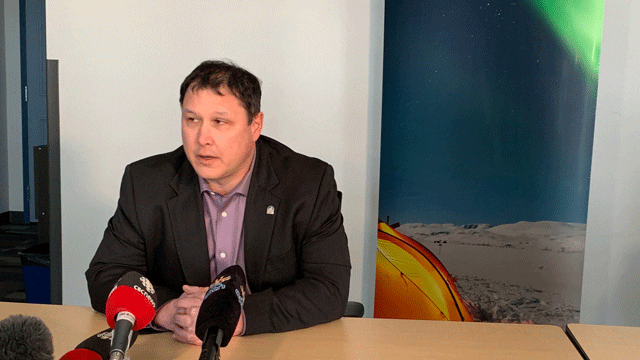
Nunavut’s health minister has declared a public health emergency as Nunavut remains one of three federal jurisdictions without a positive test for COVID-19.
“I’m declaring a public health emergency,” said Health Minister George Hickes, going on to explain exactly what that means.
Starting Friday, public gatherings are prohibited, including churches. Non-essential territorial government workers will work from home.
Bars will close; restaurants will be limited to take-out only, with no more than 10 people in a line. Taxis are limited to one pick-up per fare – Nunavut cabs could previously pick up more than one customer at a time.
People arriving from outside of Nunavut are being told to self-isolate for a “mandatory” 14 days upon arrival, and non-essential visitors are not welcome.
“As of today, there’s no confirmed cases [of COVID-19] in Nunavut yet,” explained Premier Joe Savikataaq. “We have 50 to 60 people who have been tested, approximately half of them have been returned and they’re all negative. We have 10 to 15 people who were in self-isolation who have been cleared, and they are not in self-isolation anymore.”
Chief Public Health officer Dr. Michael Patterson confirmed that Nunavut Arctic College will be closing as well, the one remaining educational institution in the territory.
On March 11, the World Health Oganization declared the COVID-19 outbreak a pandemic. APTN News is reporting from across the country on the viral outbreak and how it is impacting Indigenous communities. For more information click here: COVID-19
Savikataaq called for calm.
“We’re asking Nunavummiut not to panic. We’ve seen on TV and here in Nunavut, people stocking up and hoarding, buying toilet paper and non-perishable foods. We’ve been assured by the retailers that supplies will continue to come in. Leave some for the others that can’t afford to stock up,” he said.
Hickes admitted that the government has limited power to enforce many of these restrictions, and called upon the better nature of Nunavummiut to prevail.
“Its very difficult for us to actually enforce, we’re relying on members of the public to recognize how critical a step this is, to continue with the safety of their family, and the community.”
To explain what the 14-day self-isolation for anyone arriving in Nunavut actually means, Hickes was blunt.
“What that means is, when you land at home, you go home, and you do not leave again for 14 days. No post office, no stores, no work. No matter how well you feel, you stay home for 14 days,” said Hickes.
There is a sort of exemption for essential workers. RCMP and health care workers will have a limited exception.
“We fully realize that these restrictions can hamper a number of essential services that may not be able to run safely with a 14 day [self-isolation],” explained Patterson. “For nurses, and RCMP, and other first responders, and for essential municipal services, we are going to be looking at ways of enhanced screening for those people. It would be a daily check-in, that they do not have symptoms, and if they develop symptoms, they are immediately withdrawn from work.”
He added that if the essential workers were coming from a “high risk area, where we know community transmission is happening”, those exemptions are off the table.
Read more:
Holding at zero: No confirmed COVID-19 cases in Nunavut as preparations ramp up
Statistically, Nunavut is likely to have a positive test for COVID-19 eventually. When that happens, there is a pre-planned response.
“Then we shut down everything except the absolutely essential services in the community,” said Patterson. “We’d isolate the individuals who had been in contact with COVID-19, we’d begin enhanced testing and surveillance of anybody who has been in contact, and attempt to maintain containment around that individual, and their contacts.”
Wednesday, the federal government announced a number of economic programs to help Canadians get through the lost income from COVID-19 isolation. The Government of Nunavut has just begun to look at that funding.
Hickes is also the finance minister. He has a rough figure in mind for just the medical end of things.
“We have some rough, back of the napkin, numbers. Our initial look says we are looking at in excess of $40 million. We did get indications from our counterparts in the federal government that they are willing and able to assist,” said Hickes.
There are many Nunavut students part way through their semester in southern locations. For now, they are being asked to hold in place.
“If they decide to return to Nunavut, we would ask them to self-isolate for 14 days after they arrive in Nunavut,” said Patterson.
Hickes added, “Right now, where people are is the safest place for them to be. We’re going to continue FANS [Nunavut student aid] while they’re not attending school to make sure that there is income coming in. The majority of schools have suspended school, not cancelled. So I’d recommend students stay near-by.”
Hickes ended the press conference with a plea to Nunavummiut to follow the government guidelines.
“We all have a responsibility – our time is right here, right now – to limit the impact of COVID-19 here in Nunavut. Everybody needs to participate. Everybody needs to buy in to these plans. Otherwise, all these things that we’re doing? These drastic measures we’re taking? They’re to no avail, to no effect,” said Hickes.
“We need everyone to participate in this. I can’t say enough how we need to give our health centre staff some time to adjust. If it is non-urgent care, please wait. We need everyone to buy into this for these measures to be effective.”









